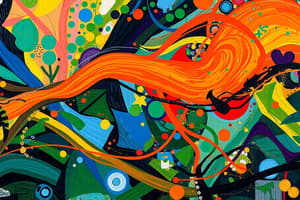Podcast
Questions and Answers
Which of the following is an example of sound energy?
Which of the following is an example of sound energy?
- The sun
- A bicycle
- A light bulb
- A musical instrument (correct)
Heat energy can be felt and is generated by objects like stoves and hair dryers.
Heat energy can be felt and is generated by objects like stoves and hair dryers.
True (A)
What type of energy is involved when a person rides a bike?
What type of energy is involved when a person rides a bike?
movement energy
Many musical instruments use _____ input to create sound.
Many musical instruments use _____ input to create sound.
Match the following energy outputs with their corresponding sources:
Match the following energy outputs with their corresponding sources:
What is the main source of energy for living things?
What is the main source of energy for living things?
Herbivores are animals that eat both plants and meat.
Herbivores are animals that eat both plants and meat.
What do we call the chain through which energy is transferred from one living thing to another?
What do we call the chain through which energy is transferred from one living thing to another?
Energy can be stored in sources such as food, wood, coal, natural gas, and _____ products made from natural crude oil.
Energy can be stored in sources such as food, wood, coal, natural gas, and _____ products made from natural crude oil.
Match the types of energy to their descriptions:
Match the types of energy to their descriptions:
Which of the following factors does NOT determine daily energy needs?
Which of the following factors does NOT determine daily energy needs?
Appliances do not require an input of energy to function.
Appliances do not require an input of energy to function.
Give an example of a carnivore.
Give an example of a carnivore.
Flashcards are hidden until you start studying
Study Notes
Energy and Living Things
- Living organisms require energy for survival and various life processes.
- Energy enables work, including movement and changes in the environment.
- The Sun serves as the primary source of energy for life on Earth.
- All living organisms depend on food to obtain energy; plants can produce their own food, while animals consume plants or other animals.
Energy Transfer in Ecosystems
- Energy transfer occurs through food chains, depicting the flow of energy from one organism to another.
- Daily energy needs vary based on several factors:
- Age: Children and babies need more energy due to growth and high activity levels.
- Activity Level: Increased physical activity demands higher energy intake from nutrient-rich foods.
- Health: Illness can elevate energy requirements for recovery.
- Gender: Energy expenditure differs between boys and girls.
Types of Organisms
- Herbivores: Consume only plants (e.g., cows).
- Carnivores: Eat only meat (e.g., lions).
- Omnivores: Consume both plants and meat (e.g., humans).
Types of Energy
- Energy manifest in various forms, including movement, heat, light, and sound.
- Energy sources include food, wood, coal, natural gas, oil products (e.g., petrol, diesel, paraffin).
Machines and Appliances
- Machines are equipment with moving parts requiring energy input to function.
- Appliances use domestic energy sources (electricity, gas, paraffin) for operation and yield useful energy output.
- Examples of energy outputs include:
- Heat from stoves or hair dryers.
- Sound from radios or microphones.
- Light from lamps or torches.
- Movement from drills or lawnmowers.
Energy Types Explained
- Light Energy: Travels in rays; visible (e.g., sunlight) and invisible (e.g., ultraviolet).
- Heat Energy: Felt as warmth; originates from the sun or combustion processes (burning wood).
- Movement Energy: Kinetic energy associated with motion (e.g., riding a bike).
- Sound Energy: Produced by vibrating objects, detectable by ears (e.g., musical instruments).
Energy Systems
- Energy systems consist of input, conversion, and output stages.
- Common examples include:
- Musical instruments, requiring movement input (blowing, beating) to produce sound as output.
- Many instruments have moving or vibrating components that generate sound energy.
Studying That Suits You
Use AI to generate personalized quizzes and flashcards to suit your learning preferences.



